- Home
- Marcia Talley
Occasion of Revenge Page 10
Occasion of Revenge Read online
Page 10
“That’s odd. Somebody should be there!”
Paul shrugged. “Sorry.”
“Here, let me try,” I said, taking the phone from him. “Maybe you got the number wrong.” I punched in Darlene’s number and waited. After the tenth ring, I hung up. “Not even an answering machine.” I laid the phone on the tablecloth and rested my chin on my hands. “Do you suppose he forgot?”
Emily spooned applesauce into Chloe’s mouth. “Not likely. He told me he was looking forward to it.” She studied me with serious eyes. “Maybe he’s too hung-over, Mom.”
I pushed my plate away, my lunch barely touched, knowing that Emily was probably right but a little annoyed at her for saying so. “I’m going over there.” I sent Paul my I-dare-you-to-try-and-stop-me look.
Paul folded his napkin and laid it next to his plate. “All right, but I’m coming with you.”
Emily looked up from wiping applesauce off Chloe’s chin. “Did you ever think you might be interrupting something?”
I rolled my eyes toward the ceiling, trying to wipe that picture out of my head. I stood up. “I certainly hope so!”
“We’ll be here when you get back,” Emily said. She waved a spoon. “Don’t think you’re going to stick me with the bill.”
As I passed behind her chair, I patted the top of Emily’s head. “Don’t worry, we’ll be back soon.”
I believed it when I said it, I really did. But ten minutes later, standing on Darlene’s front porch, repeatedly ringing the doorbell and listening to Speedo’s urgent barking from the entrance hall just behind the door, I forgot my promise. Darlene’s Porsche was still parked on the street, but Daddy’s car was nowhere to be seen.
Paul parked his buns on the porch railing. “Hannah, they must have gone somewhere in your father’s car. Be reasonable!”
While Paul sat there, relaxed, both hands stuffed in his pockets, I peeked through the front window. The Christmas tree lights still blazed, lamps on the end tables burned softly, and I could see the red and green glow of the indicator lights on the stereo system. Plates with bits of food still on them and half-empty glasses covered every surface. Clearly the party had gone on long after we left.
I turned around to face my husband. “Look for yourself, Paul! If they went somewhere, don’t you think they would have cleaned up first?”
“Not necessarily.”
I tapped on the window with my knuckles and was startled when Speedo lunged into view. The dog leapt onto the sofa, settled his big paws on the windowsill, and pressed his wet, black nose against the glass. I tapped on the window again. “Hey, boy!”
Speedo went berserk. He jumped off the sofa, raced in a tight circle about the room, scrunched up two scatter rugs with his windmilling paws, then leapt onto the sofa again, barking furiously.
“Hey, boy, what’s wrong?” I laid my hand flat on the window where Speedo’s nose had left a smeared impression. I turned my head to look at my husband. “Something’s wrong in there, Paul. I just know it.”
Paul was beside me in two long strides. Shading his eyes with his hand, he peered through the window, which did nothing to calm the frantic dog, who began to scrabble at the windowpane, toenails clicking on the glass. Paul straightened, walked to the front door, and turned the knob. “Locked.” He gave the doorbell another try, listened, then rapped loudly with the knocker. Speedo relocated himself behind the front door and began to howl.
“I’ll try around back.” I scampered off the porch and dashed around the side of the house, through a wooden gate, and into the garden. I careened around the patio table, exclaiming as I scraped my thigh against the arm of one of the chairs. Still swearing and rubbing the sore spot, I stepped onto the neatly laid brick patio and peered through the double French doors into the kitchen.
The screen on the TV Daddy had been lounging in front of the night before was dark. Like the living room, dirty dishes were piled on every flat surface and open bottles of alcohol, including a bottle of schnapps—Ruth’s?—stood like soldiers on the long kitchen counter. The light over the kitchen table still burned, but the candlesticks on the table were empty. My heart did a flip-flop in my chest. “The candles burned down to nothing,” I said as Paul caught up with me. “Nobody blew them out.”
I jiggled the door handle and gasped when the door swung slowly inward. I pulled it closed just as Speedo thundered into the kitchen. When the dog sat politely on the other side of the door and simply whined, I said, “I’m going in.”
“Hannah! What if they’re asleep?”
“If they are, then we’ll wake them up. If they’re gone, then what they don’t know won’t hurt them.” And before he could persuade me to change my mind, I pushed open the door and eased myself into the house.
What I saw then made Speedo hang his head: A prizewinning pile of dog poop had been deposited squarely in the middle of Darlene’s highly polished floor. I scratched behind the dog’s drooping ears. “Poor Speedo. It’s not your fault. Nobody let you out today!” Cold fingers squeezed my heart and I looked at Paul. “This is not good.”
Although sunlight flooded the kitchen, cheerful with its glossy white woodwork and blue-and-white gingham curtains, it did little to lighten my mood. “Let the dog out, Paul,” I said.
Paul held the door wide, stepped out onto the patio, and slapped his thigh. “Come on, Speedo. That’s a good boy.” But Speedo refused. I was standing under the overhead rack where copper saucepans and frying pans hung in a gleaming row when Speedo startled me by dashing past, through the pantry and into the dining room. I followed, catching sight of the dog’s tail as he disappeared around the curve in the staircase that led to the second floor. With my heart thudding, only partly from the exertion of racing up the stairs two at a time, I finally caught up with Speedo, sitting, four feet firmly planted, waiting politely by the bathroom door. My pulse drummed in my ears. I tried to breathe normally, and failed. The last time I’d followed a crazed dog there’d been a body at the end of the trail. I didn’t relish a repeat performance. So, when Paul appeared at the head of the stairs I wimped out and waggled my hand toward the door. “You open it.”
Paul reached for the knob, then swiveled his head in my direction. Our eyes locked and I knew he was reading my mind—dog, door, death. Life with Hannah is never dull. I clutched Speedo’s collar and held my breath as Paul turned the knob and … slowly, slowly … pushed open the door.
I was kneeling beside Speedo, my arms wrapped around his neck, my cheek pressed against the comforting warmth of his fur, so I didn’t see anything unusual at first.
Then Paul stumbled backward. “Sweet Jesus!”
With one hand grasping Speedo’s collar, I slowly rose until my eyes were level with Paul’s shoulder and I saw what he saw, a scene that is etched indelibly in my brain like a VCR frozen on Pause. “Who is it?” I asked.
“I think it’s Darlene.”
The naked body in the bathtub bore little resemblance to the Darlene I knew. It was the head that confused me, covered with thin graying hair that erupted from a nearly bald landscape of scalp in untidy tufts. But the nose and the chin … that patrician profile was unmistakable. Darlene’s eyes were closed and she lay in the tub peacefully, as if she were asleep.
“Is she dead?” I whispered.
“I think so.” Without touching the tub, Paul squatted on his heels and placed two fingers on Darlene’s pallid neck, just under her left ear. He nodded.
“Jesus!” And then I noticed something strange. “There’s no water in the tub!”
“I know.” Paul pointed to the plug, an old-fashioned rubberized disk on a chain. “It probably leaks.” Paul straightened his knees. “Come here, Hannah.” He pointed at something in the bottom of the tub. “What do you make of that?”
My breakfast was staging an encore, the acid combination of coffee and orange juice biting the back of my throat. I took a tentative step forward, then another. At the bottom of the tub, lodged between the drain hole and a
smooth and still shapely foot, was an empty wineglass. “She must have taken something to drink into the bath with her.” Without thinking, I reached out to retrieve the glass, then pulled my hand back in horror.
I had drawn close enough to see her breasts, to notice that they bore the sunken scars of several incisions. Darlene had undergone biopsies, maybe even a lumpectomy. Tears stung my eyes. I felt profoundly sad for this woman, this pathetic object in a cold, hard bathtub who, only hours before, had been a living, breathing human being.
Contracting cancer is a life-changing experience, I knew firsthand. Maybe that’s what had turned Darlene so cold, calculating, and get-it-while-you-can. I was nothing at all like Darlene, but because of the cancer I suddenly felt a certain kinship to her.
“Oh, cover her up!” I wailed. “A towel. Anything!”
Paul shook his head. “Better not mess with the scene.”
I wiped my eyes with the hem of my sleeve. “I wonder how she died,” I sniffed. I was no expert, except for what I saw on TV during twice-daily reruns of Law and Order. Nothing about the body indicated foul play, at least not to me. Darlene’s face was composed and her eyes were closed. She could have been napping. There were no bruise marks on her neck. No stab wounds. No bullet holes. No blunt force trauma.
“She just died, Hannah. Maybe a heart attack, or a stroke.”
“But, what happened to her hair?”
Paul pointed to a wicker footstool under the window. On it, Darlene’s familiar blond hairdo lay in a damp heap, like a slumbering cat.
I stood there with Paul for what seemed like hours, tears cooling on my cheeks, the drip drip drip of the bathtub tap thundering like a bass drum in my ears. I studied the mildewed grout between the bathtub and the tile, the way the curtains were drawn back from the window with black ribbons tied in precise bows, the wallpaper where corseted Victorian ladies fussed with their hair, powdered their cheeks or adjusted their garters. I willed any one of them to speak up and tell us the story of what happened in this room. Finally, Paul grabbed my hand and pulled me out into the hall where Speedo waited obediently, his head on his paws. But not before I had noticed my father’s red toothbrush still in the holder over the sink, and his Norelco shaver dangling from the end of a cord plugged into an electrical outlet in the fluorescent light fixture over the medicine cabinet.
I rooted in my purse for the cell phone and dialed 911. Story of my life.
While we waited downstairs in the kitchen for the ambulance to arrive, Paul used a spatula and a wad of paper towels to clean up after Speedo. But all the time I was filling Speedo’s bowl with kibble and his dish with fresh water I was wondering: Where in bloody hell is my father?
chapter
9
Captain Younger of the Chestertown Police Department wanted to know the same thing. While his officers secured the scene upstairs and we waited for the Kent County medical examiner to arrive, Younger, dressed in dark blue uniform trousers and a light blue shirt, shotgunned us with questions.
The man was good. Almost before I realized what was happening, he had pried open the family closet and the skeletons had come rattling out in all their sordid splendor.
During the interview I sat stiffly on a two-cushion sofa next to Paul, our shoulders touching. Through the French doors I could see Speedo snuffling joyfully about in the patches of parsley, sage, rosemary, and thyme in Darlene’s immaculate garden. I wondered if I’d ever again experience such pure, mindless joy.
“Your father was living here, then?” Younger asked.
I nodded. “Most of the time.”
“So, where is he?”
“Captain Younger, I honestly don’t know.”
The Kent County medical examiner turned out to be a nurse from the local hospital. When she showed up, followed by the Maryland State Police crime lab, things got busy and Captain Younger let us go.
Halfway back to the hotel I grabbed Paul’s arm. “Holy Mother of God! I forgot to call Emily!” We found our daughter waiting inside, pacing the long central hallway from the front door of the hotel to the reception desk in the back, holding Chloe and frantic with worry. “I didn’t know what to do,” she complained. “I finally let them clear the plates away.”
After we explained what had happened and arranged with the hotel to stay another night, Paul suggested we go back into the restaurant and order some lunch, although it was well past two o’clock by then.
I had forked up the last bite of a poached pear tart when a white police cruiser with a splash of red on its rear quarter panel pulled into a parking space on High Street just outside the dining room window. I watched, chewing thoughtfully, as Captain Younger uncoiled himself from the driver’s seat, adjusted his sunglasses, slammed the door of the cruiser, then stepped onto the porch. “Oh, oh,” I said.
Paul eased himself out of his chair. “Best to get it over with.” He waylaid the officer at the door to the dining room, just as he passed by.
We invited Younger to join us for coffee. While I filled his cup, he pulled up a chair, moved some glassware, dirty dishes, and the salt and pepper shakers aside, then dealt some items out on the tablecloth in front of us. They looked like greeting cards encased in plastic sleeves. “What do you know about these?”
I started to pick up one of the cards, then withdrew my hand, waiting for his permission to touch them.
“It’s OK,” he said. “Have a look.”
I used my fingertips to slide the cards around the tabletop. I must have had a question mark on my face because Younger suddenly said, “We found them in a pigeonhole in her desk, tied in a bundle with white string.”
Each plastic sleeve held a greeting card, open and flat. The illustrations and writing on the face of each card seemed tame enough, but if you flipped the sleeve over, you could read the ugly sentiment inside.
When it comes to describing you,
One word says it all …
Bitch!
Emily leaned toward me, reading the card over my shoulder. “Well, she wasn’t a very nice woman.” She smiled at the officer, then picked up another card and read aloud,
Consider this a personal invitation …
Go fuck yourself!
“Emily!”
“I didn’t use the F word, Mother, the card did.” She flapped it at me.
I tried to look serious. “Daddy mentioned that somebody was sending Darlene poison-pen mail. This must be some of it.”
The jeweled ring in Emily’s eyebrow shot up. “You don’t think Darlene was murdered, do you?”
I looked into the officer’s intelligent eyes and said, “Somebody did try to poison her dog.”
Emily gasped. “Speedo?”
I nodded. “Daddy told me about it.”
Paul was examining a postcard of Arlington Cemetery on which someone had scrawled, “Wish you were here.” He laid down the card and stared at the officer. “What’s going to happen to Speedo?”
“One of the neighbors showed up. Virginia Prentice? She volunteered to keep the dog until Mrs. Tinsley’s kids decide what to do with him.”
That was good news. I fell back into my chair and prayed that he’d run out of questions and head back to the police station soon. Fat chance.
“Mrs. Ives, do you have any idea, any idea at all, where your father is?”
I shook my head. “Maybe he went home?”
“Nobody’s seen him in Annapolis.”
I spread my hands, palms up, and shrugged.
“Places he hangs out?”
I shook my head.
“We do need to talk to him.”
“Captain, if I knew where he was, I’d certainly tell you.” I met his gaze squarely. “We want to find him just as badly as you do. I’m worried about him.” I explained about Mother’s recent death and Daddy’s even more recent engagement to Darlene. “If she died in her bath and Daddy found her body …” I paused and took a deep breath. “… There’s no telling what he might have done.”
As Paul told Younger about Daddy’s accident on the Bay Bridge and described the rental car, I watched a range of emotions play across the officer’s face. I could see the wheels turning, almost hear Younger thinking, This must be the unluckiest guy alive.
But my radar was down. That wasn’t what he was thinking at all. “Where would your father have been at approximately one-fifteen last night, Mrs. Ives?”
“I don’t know. We left the party around ten.” A wave of nausea and dread washed over me. “Why? Is that when she died?”
“We don’t know when she died; that’ll be determined by the Office of the Chief Medical Examiner over in Baltimore.”
“Then why do you ask?”
“We had a hit-and-run last night. Somebody ran down an elderly gentleman out near the intersection of routes two-thirteen and three-oh-five.”
I gasped, my head swimming. If I hadn’t been holding Paul’s hand, I might have keeled over. “My father?” I croaked.
He shook his head. “No. He was a local waterman, on his way home from a late-night card game.”
“Was? Do you mean he’s dead?”
“I’m afraid so.”
A nightmare scenario flashed through my head. Daddy, drunk as usual, discovers Darlene dead and drives off in a haze of alcohol and grief. An old man, crossing the road, frozen in the glare of oncoming headlights. A cry. A sickening thud. I opened my mouth to proclaim Daddy’s innocence when Paul squeezed my hand again, hard. “Perhaps if you talked to the other guests. My wife and I didn’t know many of them, but …” Paul looked at me. “What was that strange lady’s name, honey?”
“LouElla,” I said. “LouElla Van Schuyler.”
“Yes,” Paul continued. “Check with LouElla. She appears to know everybody.”
Captain Younger smiled cryptically. “And everybody in town knows LouElla.” He gathered up the plastic-covered greeting cards, tucked them into a folder, and stood to go. “Don’t worry,” he said. “We’ll put out a broadcast. We’ll find him.”

 Unbreathed Memories
Unbreathed Memories Tangled Roots
Tangled Roots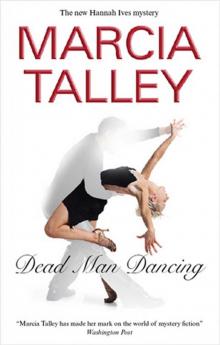 Dead Man Dancing
Dead Man Dancing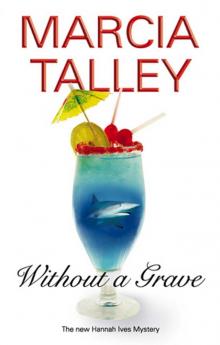 Without a Grave
Without a Grave Sing It to Her Bones
Sing It to Her Bones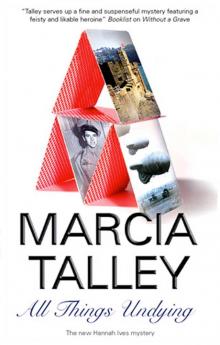 All Things Undying
All Things Undying Naked Came the Phoenix
Naked Came the Phoenix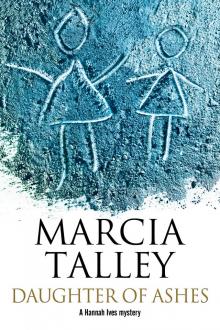 Daughter of Ashes
Daughter of Ashes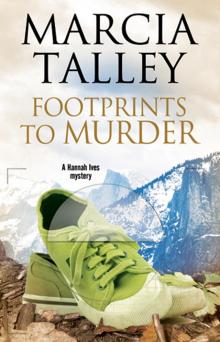 Footprints to Murder
Footprints to Murder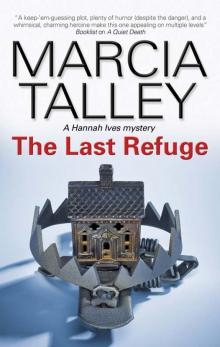 The Last Refuge
The Last Refuge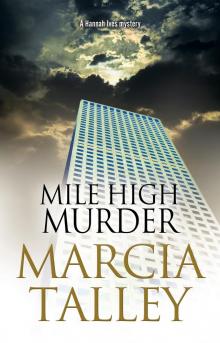 Mile High Murder
Mile High Murder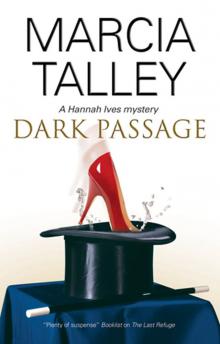 Dark Passage
Dark Passage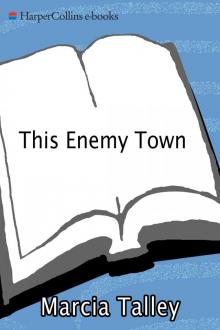 This Enemy Town
This Enemy Town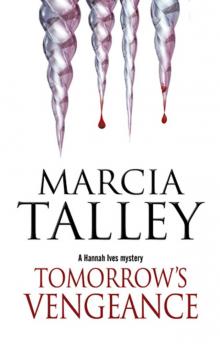 Tomorrow's Vengeance
Tomorrow's Vengeance Occasion of Revenge
Occasion of Revenge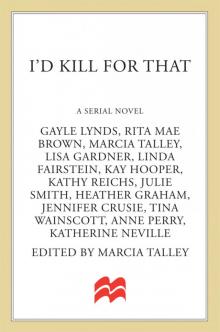 I'd Kill For That
I'd Kill For That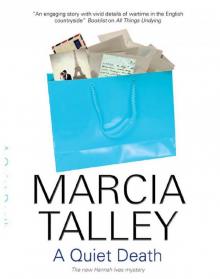 A Quiet Death
A Quiet Death